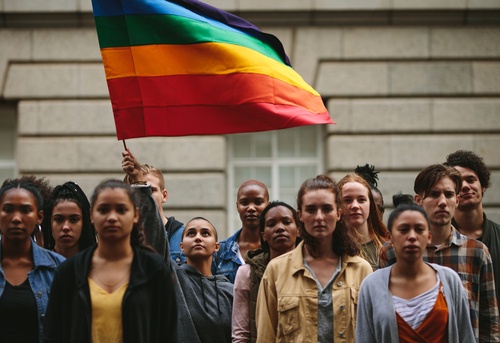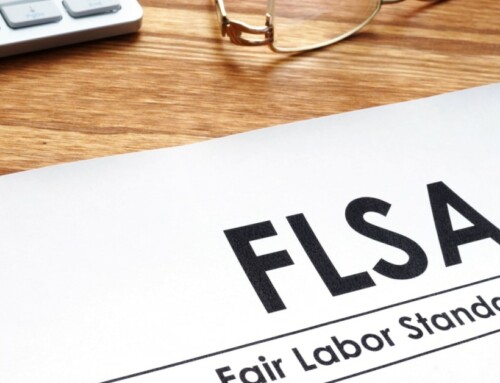On June 15, 2020, the U.S. Supreme Court held that Title VII of the Civil Rights Act of 1964 prohibits discrimination in employment based on an employee’s or job candidate’s sexual orientation or transgender status. The Court based its decision on Title VII’s express prohibition on discrimination based on sex. Writing for the 6-3 majority, Justice Gorsuch opined:
“Today, we must decide whether an employer can fire someone simply for being homosexual or transgender. The answer is clear. An employer who fires an individual for being homosexual or transgender fires that person for traits or actions it would not have questioned in different sex members. Sex plays a necessary and undisguisable role in the decision, exactly what Title VII forbids.”
Title VII’s Prohibition on Sex Discrimination Prohibits Discrimination Against Individuals Who are Gay or Transgender
As enacted, Title VII prohibits discrimination in employment based upon five protected characteristics: race, color, religion, sex, and national origin. As written, Title VII does not explicitly prohibit discrimination based on sexual orientation or transgender status. For this reason, several states have adopted laws that extend protections to gay and transgender individuals. South Carolina is not one of these states.
As we previously discussed, the ambiguity of the term “sex” in Title VII left an open question as to whether sexual orientation and transgender status were protected; and, while the Equal Employment Opportunity Commission (EEOC) had issued a ruling in favor of protecting gay employees and job candidates during the Obama administration, this ruling was not legally binding on federal (or state) courts. Insofar as relevant to this discussion, Title VII states:
“It shall be an unlawful employment practice for an employer—(1) to fail or refuse to hire or to discharge any individual, or otherwise to discriminate against any individual concerning his compensation, terms, conditions, or privileges of employment, because of such individual’s . . . sex, or . . . (2) to limit, segregate, or classify his employees or applicants for employment in any way which would deprive or tend to deprive any individual of employment opportunities or otherwise adversely affect his status as an employee, because of such individual’s . . . sex . . . .”
The Supreme Court’s June 15 ruling in Bostock v. Clayton County, 590 U.S. ___ (2020), resolves the issue decisively. Examining the “ordinary public meaning” of Title VII’s prohibition on sex-based discrimination, the Court ruled that, “[f]or an employer to discriminate against employees for being homosexual or transgender, the employer must intentionally discriminate against individual men and women in part because of sex.”
In support of the Court’s holding, Justice Gorsuch also cited three prior cases in which the Court had acknowledged that Title VII’s prohibition on sex-based discrimination extends beyond decisions based purely on whether an employee or job candidate is a man or a woman. These cases are:
- Phillips v. Martin Marietta Corp., 400 U.S. 542 (1971) – Title VII prohibits employers from refusing to hire women with young children while hiring men with children of the same age.
- Los Angeles Dept. of Water and Power v. Manhart, 435 U.S. 702 (1978) – Title VII prohibits employers from requiring women to make larger pension fund contributions than men (in this case, “[t]he employer sought to justify its disparate treatment on the ground that women tend to live longer than men, and thus are likely to receive more from the pension fund over time).
- Oncale v. Sundowner Offshore Services, Inc., 523 U.S. 75 (1998) – Title VII holds employers liable for sexual harassment perpetrated by male employees against male employees and not solely for opposite-sex harassment or discrimination.
Importantly, while Bostock v. Clayton County involved circumstances in which employees were terminated after revealing their sexual orientation or transgender status, the Supreme Court’s decision does not apply exclusively to circumstances in which employees are fired because they are gay or transgender. The Court’s decision speaks to the definition of sex-based discrimination, generally. As a result, South Carolina employers must now ensure that no employment-related decisions are made based upon an employee’s sexual orientation or transgender status.
What Should South Carolina Employers Do Following the Supreme Court’s Decision in Bostock v. Clayton County?
Given the importance of the Supreme Court’s holding in Bostock v. Clayton County, what should South Carolina employers do in response to the decision? Most immediately, employers must ensure that their internal employment policies prohibit discrimination against gay or transgender employees. Many employers are likely to have these internal prohibitions in place already. Still, those that do not will need to update their policies to reflect the Court’s interpretation of Title VII’s prohibition on sex-based discrimination.
Employees should also be aware of the company’s policy against discrimination based on sexual orientation and transgender status. Employers should provide training with a requirement for employees to certify that they know the scope of Title VII’s protections.
In the future, employers in South Carolina must handle complaints of discrimination based on sexual orientation and transgender status in the same manner that they handle all other claims of discrimination and harassment in the workplace. This means taking the complaint seriously, conducting a prompt and thorough investigation, and documenting both the process and the investigation outcome. If evidence uncovered during the investigation reveals a possible violation of Title VII, then appropriate remedial and defensive action should be taken promptly under the guidance of the company’s employer defense counsel.
Contact the South Carolina Employment Lawyers at Gignilliat, Savitz & Bettis, LLP
South Carolina employment lawyers at the Gignilliat, Savitz & Bettis, LLP exclusively represent employers in employment-related matters. In business for more than 50 years, we have helped companies statewide maintain compliance, defend against employee complaints, and protect their bottom lines. If you have questions about your company’s obligations in light of the Supreme Court’s decision in Bostock v. Clayton County, we encourage you to get in touch. To schedule an appointment, call us at 803-799-9311 or inquire online today.






